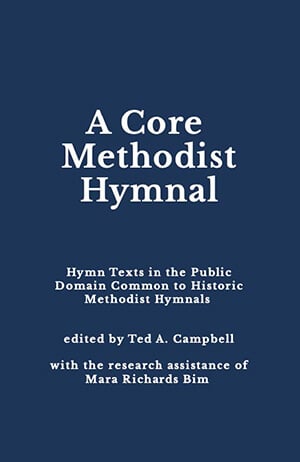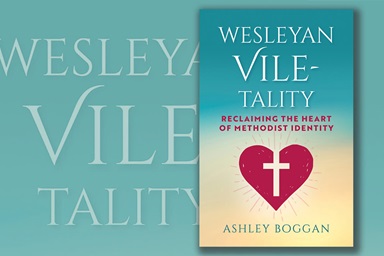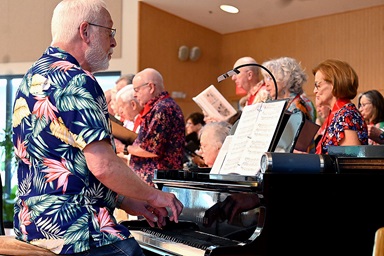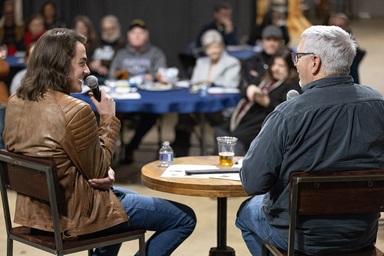Key points
- The Rev. Ted Campbell has edited and published “A Core Methodist Hymnal, which collects the texts of 126 hymns in the public domain.
- Campbell is a longtime professor at United Methodist seminaries and an authority on the great hymn writer Charles Wesley.
- The book is intended as a devotional or study book for individuals and small groups and includes commentaries by Campbell after each hymn text.
The Rev. Ted Campbell sings the old hymns and encourages fellow United Methodists to do the same.
But he’d love to see them reading those hymns too.
After all, says Campbell, hymn texts are poetry. Read carefully, lingered over, they offer pleasures and theological depth that can prove elusive during the forced march of congregational singing.
“When you sing (a hymn text), you don’t always get the nuances,” said Campbell, who will retire May 31 as Albert C. Outler Professor of Wesley Studies at Perkins School of Theology.

“A Core Methodist Hymnal” has the words, but no music, for 126 hymns that have been included in nearly all of the officially recognized Methodist hymnals across the generations. Book cover image courtesy of the Rev. Ted Campbell.
To further hymn reading, Campbell has edited and brought forth “A Core Methodist Hymnal,” a collection of 126 enduring hymn texts in the public domain. The book is part of a broader project of Campbell’s to highlight early Methodist materials that he considers crucial to Christian formation in the Methodist way.
With the old hymns, in particular, Campbell sees familiarity slipping away, as many churches have embraced contemporary Christian music. Among churches that do sing the old hymns, many project the words on a screen, which Campbell notes does not allow for close study of texts or show how they fit in the broader “way of salvation” that hymnals teach.
Campbell dedicated “A Core Methodist Hymnal” to his late mother, Lucretia Campbell, who remembered hymns even after Alzheimer’s robbed her of the names of close friends.
“Methodist people like my mother may never have read the Articles of Religion or John Wesley’s sermons, but they sang these hymn texts over and over, and the hymn texts shaped them as Christians,” Campbell writes in the introduction to “A Core Methodist Hymnal.”
Campbell’s book kicks off, as Methodist hymnals almost invariably do, with Charles Wesley’s “O for a Thousand Tongues to Sing.” It includes many of Wesley’s hymn texts, as well as famous ones from other star Protestant writers, including Isaac Watts (“When I Survey the Wondrous Cross”), John Newton (“Amazing Grace”) and Fanny Crosby (“Blessed Assurance”).
It’s a words-only book, shorn of musical notation as the earliest hymnals were. And it’s a labor of love. Campbell published the book himself, and while copies of the slim paperback are for sale, he’s made a PDF version available for free.
Campbell intends “A Core Methodist Hymnal” for individuals, Sunday school classes and other small groups.
“I see it as a devotional book that brings to the contemporary reader what was the ‘hit parade’ of Methodist spirituality in the 19th century and even before,” he said.
Those texts have a lyricism that doesn’t require music to impress. Consider this stanza from Charles Wesley’s “Depth of Mercy”:
I have long withstood his grace,
long provoked him to his face;
would not harken to his calls
grieved him by a thousand falls.
Or the first lines of a 1758 text by Robert Robinson:
Come, thou fount of every blessing;
tune my heart to sing thy grace.
Streams of mercy, never ceasing,
call for songs of loudest praise.
Each hymn text in “A Core Methodist Hymnal” is followed by a pithy commentary from Campbell. He becomes the reader’s guide through the texts.
Many of his commentaries are explanatory, a few personal.
After the text of “I Need Thee Every Hour,” Campbell writes: “I can still hear my mother’s alto voice on this one. It’s a good thing for children to hear their parents sing that they need God every hour. But I may have been the reason.”
Campbell on Methodist hymnody
The Rev. Ted Campbell was a guest on “The Weight” podcast, talking about Methodist hymnody and “A Core Methodist Hymnal.” Click here to listen.
Campbell is a well-known, widely published historian of Methodism. He grew up in southeast Texas, part of a family that, on his mother’s side, has been Methodist for generations.
He graduated from Methodist-affiliated Lon Morris College and Southern Methodist University, while also earning degrees from the University of North Texas (classics) and Oxford University in England.
Campbell, an ordained elder in the Texas Conference, has taught at Methodist Theological School in Ohio, Duke Divinity School, Wesley Theological School and, since 2006, at Perkins. He served as president of Garrett-Evangelical Theological School, yet another United Methodist seminary, from 2001 to 2005.
Few know as much as Campbell about the brothers John and Charles Wesley, founders of the Methodist movement. Campbell is a past president of the Charles Wesley Society.
“It’s a group of Charles Wesley nerds,” he said. “They’ll just start singing at any given point in a meeting.”
In editing “A Core Methodist Hymnal,” Campbell filled a study carrel at Perkins’ Bridwell Library with old hymnals, some from his personal collection, some from Bridwell’s.
One of his Perkins students, Mara Richards Bim, had told him of her love of old hymns, and of having inherited her grandmother’s hymnal collection.
Campbell had research funds available, so he asked Bim if he could hire her to help him pull the book together.
“I was like, ‘Yeah! I’d love to do it,’” she recalled.
Bim would ultimately build a spreadsheet showing hymns common to nine official Methodist hymnals published between 1780 and 1996. They included the 1989 United Methodist Hymnal, as well as hymnals edited for British Methodists and for African American Methodists.
Ten hymns were found in all the hymnals, including Charles Wesley’s “Love Divine, All Loves Excelling” and Isaac Watts’ “O God, Our Help in Ages Past.”
Subscribe to our
e-newsletter
Another 33 hymns — among them “When I Survey the Wondrous Cross,” “Rock of Ages” and “Abide With Me” — were in eight of nine hymnals. A larger group, including “Amazing Grace,” were in seven of nine.
Campbell included in “A Core Methodist Hymnal” texts found in at least seven hymnals. He also made room for texts by Fanny Crosby and Charles Albert Tindley, thus boosting female and African American representation.
Nearly a third of the hymn texts are by Charles Wesley.
“He gave us the core of the core” of Methodist hymnody, Campbell said.
Early readers of Campbell’s book, which came out last summer, have included members of the Sunday school class he has taught for 15 years at Dallas’ Lovers Lane United Methodist Church.
“They would say, ‘I’ve never just sat and read the text.’” Campbell said. “They all commented on how much more you understand when you read it, and especially when you read it aloud. Just seeing where the commas go can make a difference.”
A surprise enthusiast for “A Core Methodist Hymnal” has been Campbell’s friend the Right Rev. Stephen Duncan, a leader of the Orthodox-Catholic Church of America and director of fine arts for the Galveston (Texas) Independent School District.
Duncan was so intrigued by Campbell’s book that he began making music videos of its hymn texts, often with his own vocals.
He kept going and has now posted videos of all 126 hymns.
“It’s so cool,” Campbell said of Duncan’s effort. “I was delighted.”
Of “A Core Methodist Hymnal,” Duncan said, “It’s not an Orthodox book. It’s a Methodist book. And it’s a great collection of Methodist thought and hymnody.”
Retirement from Perkins looms for Campbell, but not idleness. He’ll continue as the Texas Conference archivist, and he’s at work on a history of southeast Texas. He moves among hobbies, including guitar-playing and drone videography.
He’ll keep teaching Sunday school, and he’ll teach through his books, including “A Core Methodist Hymnal.”
It’s full of scholarly tidbits, such as this:
“Charles Wesley originally wrote ‘Hark! How all the welkin rings.’ But ‘welkin’ (meaning the dome of the heavens) was not a common word and George Whitefield mercifully made it ‘Hark! The herald angels sing.’”
Sam Hodges is a Dallas-based writer. Contact him at 615-742-5470 or [email protected]. To read more United Methodist news, subscribe to the free UM News Digests.




